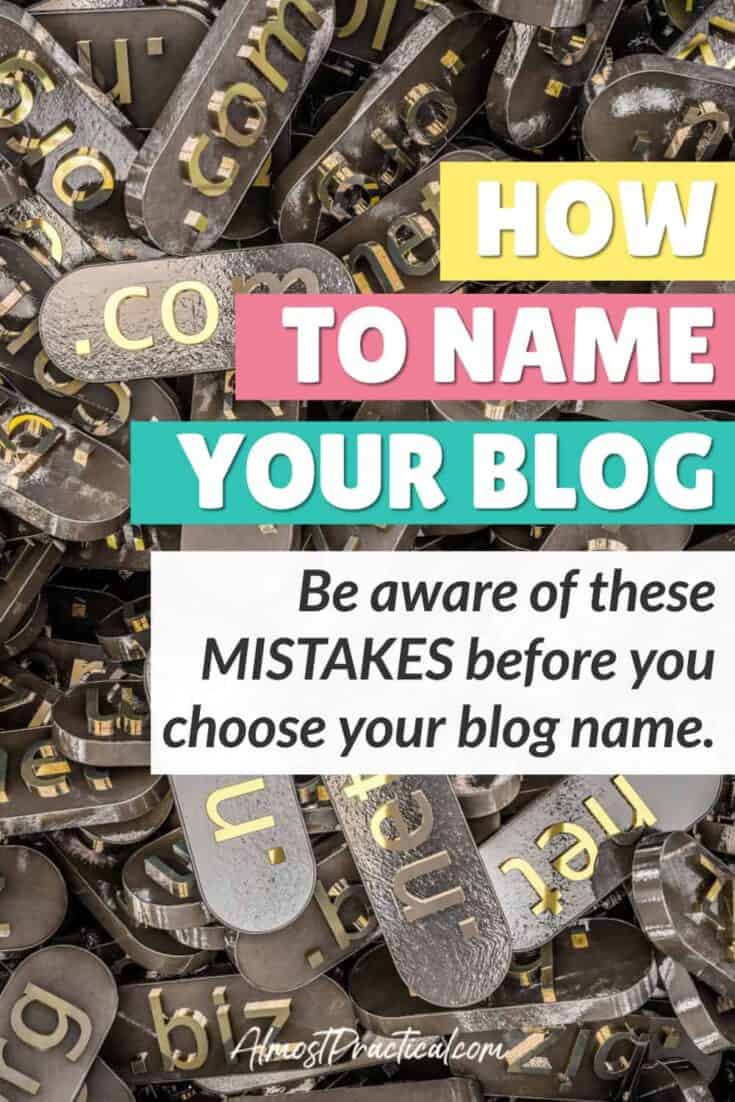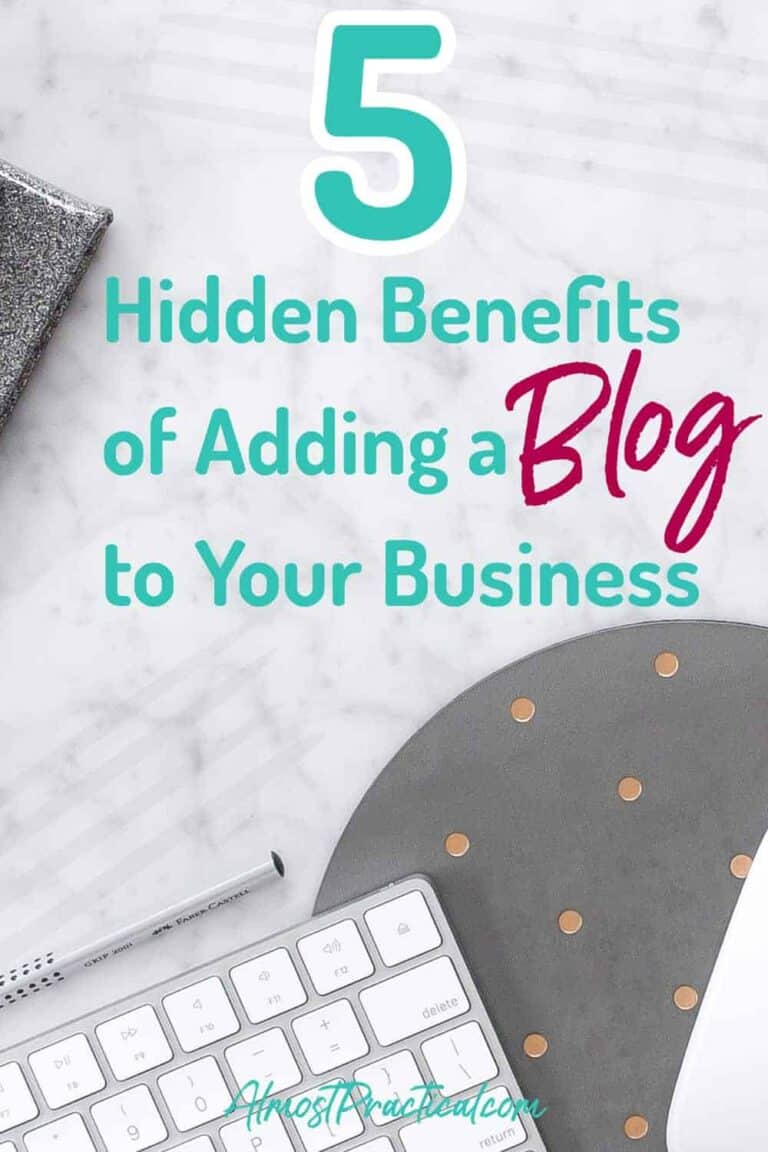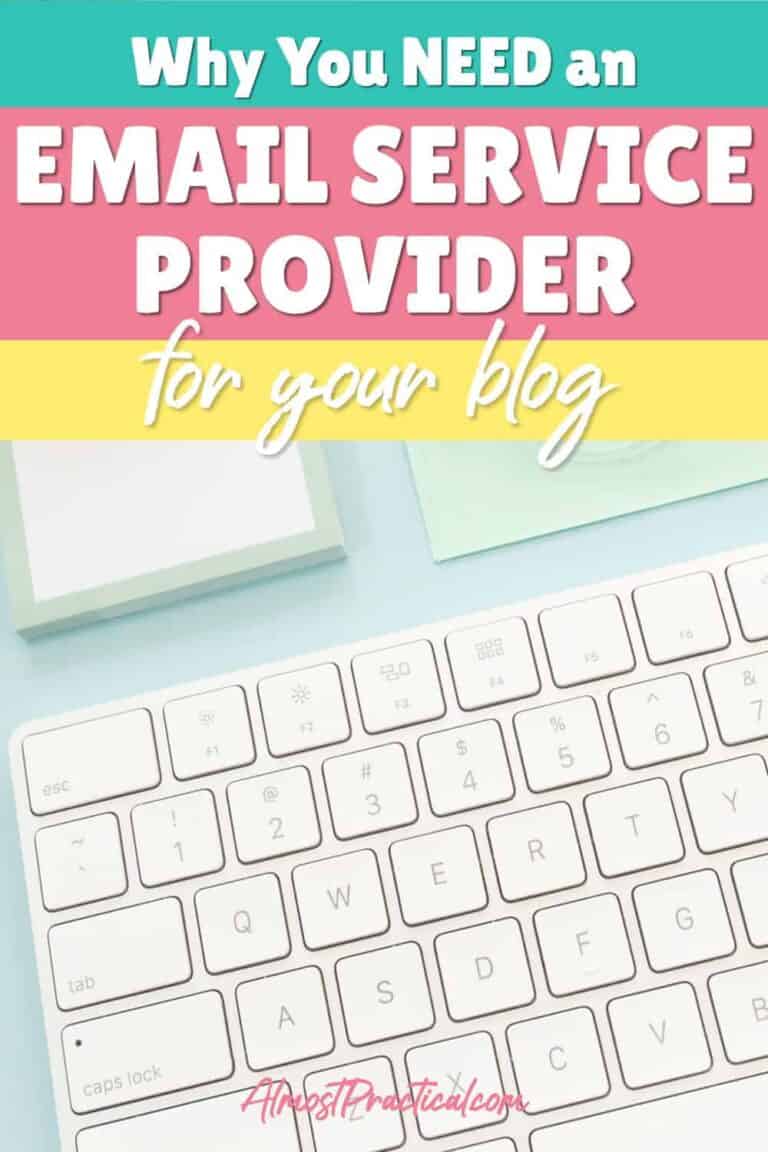How To Name Your Blog
This post may contain affiliate links which means I make a commission if you shop through my links.
Disclosure Policy
Your blog name is important, but it’s not worth stressing over. Use these tips to understand how to name your blog – and then get on with creating that great content.
The name you choose will be your new online home, so you want to make sure that you will be comfortable there for quite some time.

1. Try to Get the “Dot Com” Domain Extension
Even though there are many URL extensions available – blog names with the “dot com” extension are still the most popular.
It is also the most memorable extension, which is important when readers come directly to your blog.
Maybe they remembered something about it – an article they read or some little detail.
Usually they type in the name as they remember it followed by dot com.
I’m not saying that they won’t find you at dot net or something else but dot com will likely be the first place they turn to.
The Problogger blog began as a dot net domain.
Eventually Darren had to jump through several hoops to purchase the dot com domain from the previous owner.
If you start out on dot com you can avoid these issues.
2. Good Blog Names are Short and Sweet
In order to be memorable you should choose a blog name that is short and sweet.
Again, it is about being memorable.
Avoid hyphens and numbers, if possible.
Your readers may remember your domain name but they may not recall that you use hyphens.
Hyphens can also take away from the professional feel of your website.
It may be tempting to choose clever blog names that use numbers in place of letters.
While this may seem cute or like a good way to grab a website name whose traditional spelling is unvailable – it really is not a good idea.
Incorporating numbers in place of letters may actually make the URL less memorable.
A while ago Lisa at 2CreateAWebsite blog shared her thoughts about using a number in her domain name in this article.
3. Use A Descriptive URL but Don’t “Keyword Stuff”
In the olden days of the internet the going advice was to include your keywords in your domain name.
In fact the powers that be at Google even came out and said that this practice could actually help your site’s search engine rankings.
Over the years the advice changed and Google cracked down and penalized sites that appeared to be “gaming” the system.
I think that a common sense approach makes the most sense.
A good blog name will send signals to both your readers and the search engines as to what your blog is all about – in a way that looks professional and not spammy.
For example, if you own XYZ Bakery in New York – then xyzbakery [dot] com makes sense for a domain name.
But new-york-nyc-bakeries [dot] com is bad form.
And if the domain name for your blog doesn’t include a descriptive word about your business I think that is ok, too.
The search engines are smart enough to figure out what your site is about from the content that you publish.
Many huge websites have obscure yet catchy blog names – think Amazon (huge online store) or in a different niche Quicksprout (great blogging advice).
These names have are not very descriptive as to what the website is all about – yet they work well, all the same.
4. Avoid Intentional Misspellings
This tip expands more on number 3 above.
Using a twist on a traditional spelling may seem like a cool blog name but instead it makes it really hard for people to find your site.
The reality is that they won’t be able to remember your unique way of spelling it.
5. Pick a Domain Name That Can Grow With Your Business
You may think that the best blog names are descriptive, but the flip side is that these can actually limit the growth potential of your business, if what you name your blog is too narrow.
A Descriptive Blog Name Can Limit Your Growth
What if you choose XYZ Cakes as your domain name?
Right now you make fantastic cakes – but down the road you may choose to expand your business to include cookies, pies, and specialty breads.
What then?
Your domain is XYZ Cakes.
People that are looking for pies or cookies may not even click your link in their search engine results.
Keep the future in mind when selecting your blog name.
Using Your Own Name Can Limit Your Sale Potential
The same thing goes for using your own name for your blog domain.
Personally, I don’t recommend it – because one day you might want to sell your blog or business.
Including a Time or Life Stage Can Be Limiting
There are lots of blogs that focus on a particular stage of life:
- Parenting blogs use words like Mom, Mommy, Dad, Daddy, Toddlers, Babies, etc
- Millennial blogs use words like Adulting, Youth, Young etc.
- Retirement blogs
- Nomad type blogs
These can be really great names to attract your target audience – but what happens when life changes?
- Babies grow up.
- Adulting becomes real life.
- Nomads settle down.
My point is that if you want your blog to grow with you, make sure that the domain name that you choose aligns with your future vision.
6. Make Sure Your URL Is Available
I’m going to state the obvious here.
By now you should have a short list of good blog names that could possibly work for your new website.
The next step is to run your choices through a domain name suggestion tool to see if any of them are actually available.
I use GoDaddy (get 30% off of new products) for all my domains and they have a built in tool that tells you if a domain name is available.
If your choice is already taken, the same tool will spit out some suggestions for similar names.
Just an FYI – I do use GoDaddy to purchase my domains but I use BigScoots to host my blogs – read my BigScoots review here.
7. Check the Copyright
I am not a lawyer.
But, I can tell you this – make sure that you can use the blog name that you choose without infringing on someone else’s copyright etc.
Just because the domain name is available – it does not mean that you can use it for your business.
Let me repeat – just because the URL is available for purchase – it does NOT mean that someone else does not own the copyright to that name.
You can search the United States Trademark Database as a first step.
But it is a good idea to get legal help before you get all set up.
8. Write Your Blog Name Down on Paper
Yes. You read that right.
Before choosing a blog name, write your domain down on paper to see how it looks.
Sometimes names for blogs make sense as two or three separate words – but when you run the words together, as you would for a URL then the letters start to blend and create new unintentional words.
9. Check Out Sites With Similar Names
If everything looks good so far, the next step is to take a look at sites with similar names.
Before officially naming a blog check out the [dot]net and other URL extensions of the domain name that you plan to go with.
Explore sites that use the hyphenated version or misspelled versions of your name.
If you come across social profiles that are taken, check out the related blogs.
Again, you don’t want to infringe on anyone’s copyright or have a name that is similar to your competitors.
Also, you are looking to see if sites with similar names have offensive content or things that are contrary to you and your brand.
When readers come looking for you, they might land on one of these sites instead.
10. Secure Your Social Profiles
Finally, check the major social media sites to see if your the social profile that best corresponds to your domain name is available.
For example, you will want a corresponding Twitter profile and a Facebook page as well.
It’s not a deal breaker if the name is not available on social media sites but it is a plus if it is.
Also, if your chosen social profile is taken – be sure to check out the blog of the person that has it – circling back to number 9 above.
Don’t Waste Your Time Choosing a Blog Name
You would think that finding the best domain name for your blog would be easier than it is.
Unfortunately, lots of the simple domains are taken so you have to be creative.
But, it’s not worth spending tons of time on either.
There isn’t going to be a “perfect” two or three word name that describes all the things that you do.
So, settle for good enough and move on to your money making activities like creating content to grow your traffic.
In a nutshell, try to find a short, descriptive [dot]com URL that is not copyrighted has growth potential for your blog and business.
Happy Blogging!







